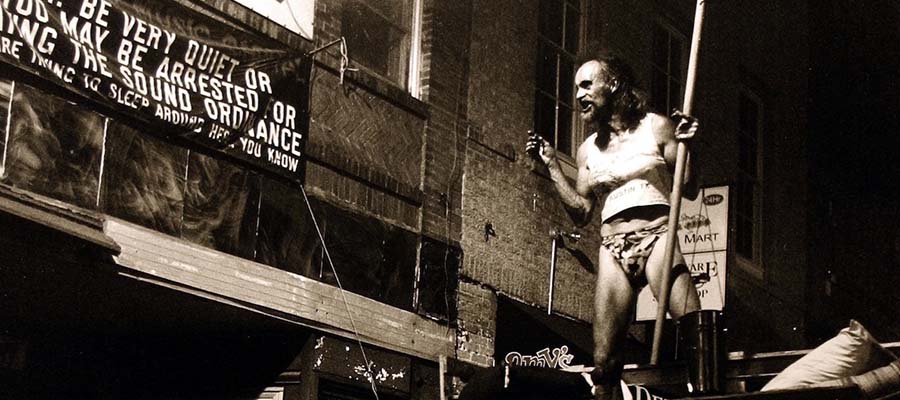Tracy Frazier first became involved in film production working as an assistant director on the feature film “Jumping Off Bridges.” Frazier went on to produce two short films, “Swerve” and “Backroads.” She currently oversees production accounting on shows such as “Houdini’s Last Secrets,” “UFOs: The Lost Evidence,” and “Shipping Wars.” “Becoming Leslie” is her directorial debut.
“Becoming Leslie” will premiere at the 2019 SXSW Film Festival on March 8.
W&H: Describe the film for us in your own words.
TF: This film is a documentary portrait of an iconic, cross-dressing homeless man named Leslie Cochran, who came to Austin, Texas in the ’90s in search of freedom and a place to belong. It’s his story to find peace and a sense of purpose in an ever-changing world.
W&H: What drew you to this story?
TF: I had heard about Leslie for years, but when I was introduced to him by Ruby Martin in 2010, I first wanted to find out what made him so iconic in Austin. What does an icon do all day?
As I got to know him better, I wanted to find out what was it about him that really resonated with people. He seemed to be a walking contradiction of sorts, meaning he was homeless but he didn’t seem like the homeless people I had seen at traffic lights or in camps.
At a time when we were struggling to run a small business and make ends meet, I wondered what his world view was: maybe he had something from which I could learn. As we got further into his world, I knew I needed to break down my own judgements—the ones I brought with me — in order to tell his story.
W&H: What do you want people to think about when they are leaving the theater?
TF: If people are able to relate to the film, then hopefully that creates space to practice empathy in their daily lives.
W&H: What was the biggest challenge in making the film?
TF: Leslie was an unreliable narrator and usually didn’t answer a question in a direct way. That was one challenge. But when he passed away in the middle of production, it became a different story— one that I wasn’t really prepared to tell.
W&H: How did you get your film funded? Share some insights into how you got the film made.
TF: So many ways. We got a little bit of seed money first. Then we went down the route of trying to get investors, but Leslie’s is a difficult story to tell, and, as first time filmmakers, that’s a big risk. So we applied for fiscal sponsorship, had two crowdfunding campaigns, got more traction with contributors, and grants.
We had a bunch of starts and stops. It really makes a difference when you know exactly the story you can tell with the footage you have so you can pitch it effectively.
W&H: What inspired you to become a filmmaker?
TF: I received a undergraduate degree in Psychology. I have always loved understanding more about human behavior and motivation, and I wanted to help people. But I didn’t continue my studies. Back then I thought being a psychologist meant sitting all day in an office and having people become dependent on you—kind of an antiquated way of thinking about it.
I circled around at odd jobs until I found the Austin Film Society. I also started working on indie films and realized that with film or TV, you can create art in a way that many people could relate to, actually take a story and bounce it off their own life and learn from it. Or not.
It’s kind of a therapy for me. Movies and television were always a place I could learn more about myself.
W&H: What’s the best and worst advice you’ve received?
TF: I’m not sure if this falls exactly under the definition of advice, but the worst advice was when we were told, “Oh you’ll have no problems raising money for this film!” So we spent a good amount of time spinning our wheels.
Ironically, it was also the best advice because we honed in on our story and never gave up.
W&H: What advice do you have for other female directors?
TF: Find the story and shoot it—rinse and repeat. I took a very long time to find my voice — about nine years with this project.
Also, mentors who are natural storytellers are amazing. And you’re never too old.
W&H: Name your favorite woman-directed film and why.
TF: I loved “Awakenings.” I saw that movie and was moved by the delicate balance of humor, humanity, vulnerability, and devastating heartbreak. Then I found out afterwards that Penny Marshall, my hero of “Laverne and Shirley,” directed it—bingo.
W&H: It’s been a little over a year since the reckoning in Hollywood and the global film industry began. What differences have you noticed since the #MeToo and #TimesUp movements launched?
TF: I’ve noticed that women feel more confident in expressing themselves and standing up for themselves and what they believe.
I like to take a page from Maya Angelou for that sense of empowerment. I wonder what she would’ve said about these two movements today. She seemed to have these two movements figured out a long time ago and maintained her fierce compassion.
https://vimeo.com/318581441







